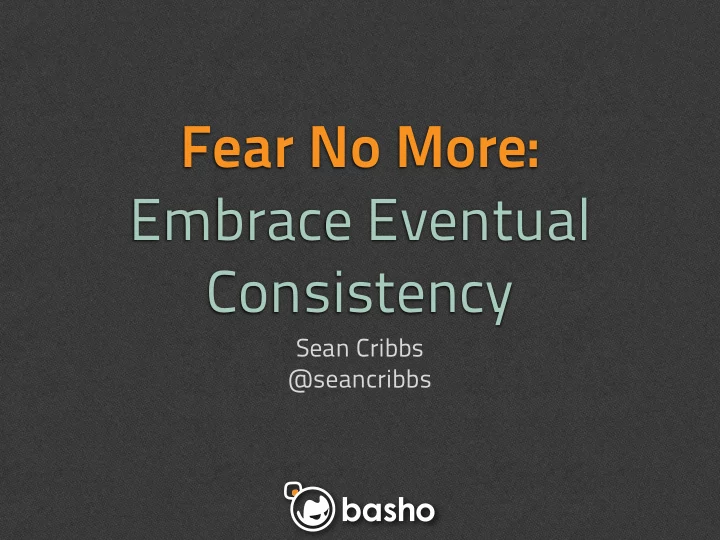

Fear No More: Embrace Eventual Consistency Sean Cribbs @seancribbs
Distributed Systems Experts
FEAR Photo from Wikimedia
ACID vs. BASE
ACID vs. BASE • Strong consistency • Weak consistency • Isolation • Availability first • Focus on “commit” • Best effort • Nested transactions • Approximate answer • Conservative • Aggressive (pessimistic) (optimistic) Fox, Gribble, Chawathe, Brewer, Gauthier - Cluster-Based Scalable Network Services (SOSP97)
ACID vs. BASE “Inconsistency is “Being unavailable the worst thing that is the worst thing could happen.” that could happen.”
Why BASE / EC?
Why BASE / EC? • “Omniscience” is expensive and slow .
Why BASE / EC? • “Omniscience” is expensive and slow . • Availability is often correlated to revenue .
Why BASE / EC? • “Omniscience” is expensive and slow . • Availability is often correlated to revenue . • Failures happen all the time .
Why BASE / EC? • “Omniscience” is expensive and slow . • Availability is often correlated to revenue . • Failures happen all the time . “Any sufficiently large system is in a constant state of partial failure.” Justin Sheehy, Basho CTO
Why BASE / EC? • “Omniscience” is expensive and slow . • Availability is often correlated to revenue . • Failures happen all the time . • You’re probably doing it already .
Safety & Liveness Leslie Lamport 1977
Safety
Safety • “Bad things don’t happen” • Point-in-time identifiable
Safety • “Bad things • mutual don’t happen” exclusion • Point-in-time • partial identifiable correctness • first-come, first-serve
Liveness
Liveness • “Good things eventually happen” • Always in future
Liveness • “Good things • starvation eventually freedom happen” • termination • Always in • guaranteed future service
ACID vs. BASE • Strong consistency • Weak consistency • Isolation • Availability first • Focus on “commit” • Best effort • Nested transactions • Approximate answer • Conservative • Aggressive (pessimistic) (optimistic) Fox, Gribble, Chawathe, Brewer, Gauthier - Cluster-Based Scalable Network Services (SOSP97)
Peter Bailis Eventual consistency is not safe “...it’s easy to satisfy liveness without being useful ... If all replicas return the value 42 in response to every request, the system is eventually consistent. ” http://www.bailis.org/blog/safety-and-liveness-eventual-consistency-is-not-safe/
Liveness of BASE • Convergence - “eventual delivery” • Responsiveness - “eventual service” • Resilience - “eventual recovery” • Consensus-free - “eventual progress”
Safety of BASE • Durability - “accepted writes are not lost” • Integrity - “data is not corrupted” • Authenticity - “data is not forged”
Real BASE Systems Photo from Wikimedia
Domain Name Service • Federated, hierarchical database • How qconsf.com becomes 77.66.16.106 • Layered system with caching
Domain Name Service • Federated, hierarchical database • How qconsf.com becomes 77.66.16.106 • Layered system with caching Diagrams from Wikimedia
Domain Name Service • Federated, hierarchical database • How qconsf.com becomes 77.66.16.106 • Layered system with caching Diagrams from Wikimedia
DNS Liveness • Convergence - caches eventually expire • Consensus-free - local authority over subtree updates • Responsiveness - intermediaries can cache results and reply quicker • Resilience - authority servers can be replicated/ load-balanced
DNS Safety • Authenticity - forgery prevented by DNSSEC
BitTorrent • Peer-to-peer cooperative large-file transfer • Dynamic membership and block discovery through the “tracker” node • Epidemic effect http://computer.howstuffworks.com/bittorrent2.htm
BitTorrent Liveness • Convergence - all peers that remain connected eventually become seeds • Resilience - loss of one peer doesn’t impede progress • Responsiveness - closer, faster peers tend to be preferred
BitTorrent Safety • Integrity - each block is checksummed to prevent corruption
The Web • Sparsely-connected graph of hypertext documents identified by URIs • Rich caching semantics: expiration, validation, control • Fluid evolution through uniform interface • Layered system (federated)
Web: Liveness • Consensus-free - local documents can be changed, moved, removed without coordination • Convergence - caching semantics prevent unbounded staleness, redirection • Responsiveness - many parties can proxy, cache • Resilience - failure of one server doesn’t stop the system
Web: Safety • Privacy & Authenticity - HTTPS/SSL/TLS • Integrity - POST responses don’t pollute caches
Dynamo 1 • Key-value store: distributed, replicated, partitioned 2 • Client requests can go to any node 3 • Low-latency at high percentiles • Many clones: Riak, Cassandra, Voldemort
Dynamo: Liveness • Convergence - read-repair, hash-tree exchanges, vector-clocks • Resilience - hinted-handoff, sloppy quorums • Responsiveness - replication • Consensus-free - loose coordination, concurrent updates
Dynamo: Safety • Authenticity - won’t serve data you didn’t store • Durability - confirmed writes are not lost
ACID vs. BASE
CONFLICT Photo by Associated Press
SPECTRUM Photo by Associated Press
hugs! Embrace Eventual Consistency
Recommend
More recommend